2020 TOYOTA HILUX charging
[x] Cancel search: chargingPage 135 of 744

1352. Instrument cluster
2
Instrument cluster
HILUX_OM_OM0K321E_(EE)
Vehicles with multi-information display type B
The positions of some warning lights and indicators differ depending on
vehicles.
Warning lights inform the driver of malfunctions in the indicated vehi-
cle’s systems.
Warning lights
*1Brake system warning
light ( P. 634)
*1SRS warning light
( P. 635)
*1
(if equipped)
Charging system
warning light ( P. 634)
*1ABS warning light
( P. 635)
*1
(if equipped)
Low engine oil pressure
warning light ( P. 634)
*1
(if equipped)
Power steering system
warning light ( P. 635)
*1, 2Malfunction indicator
lamp ( P. 635)
*1
(if equipped)
Slip indicator (P. 636)
Page 203 of 744
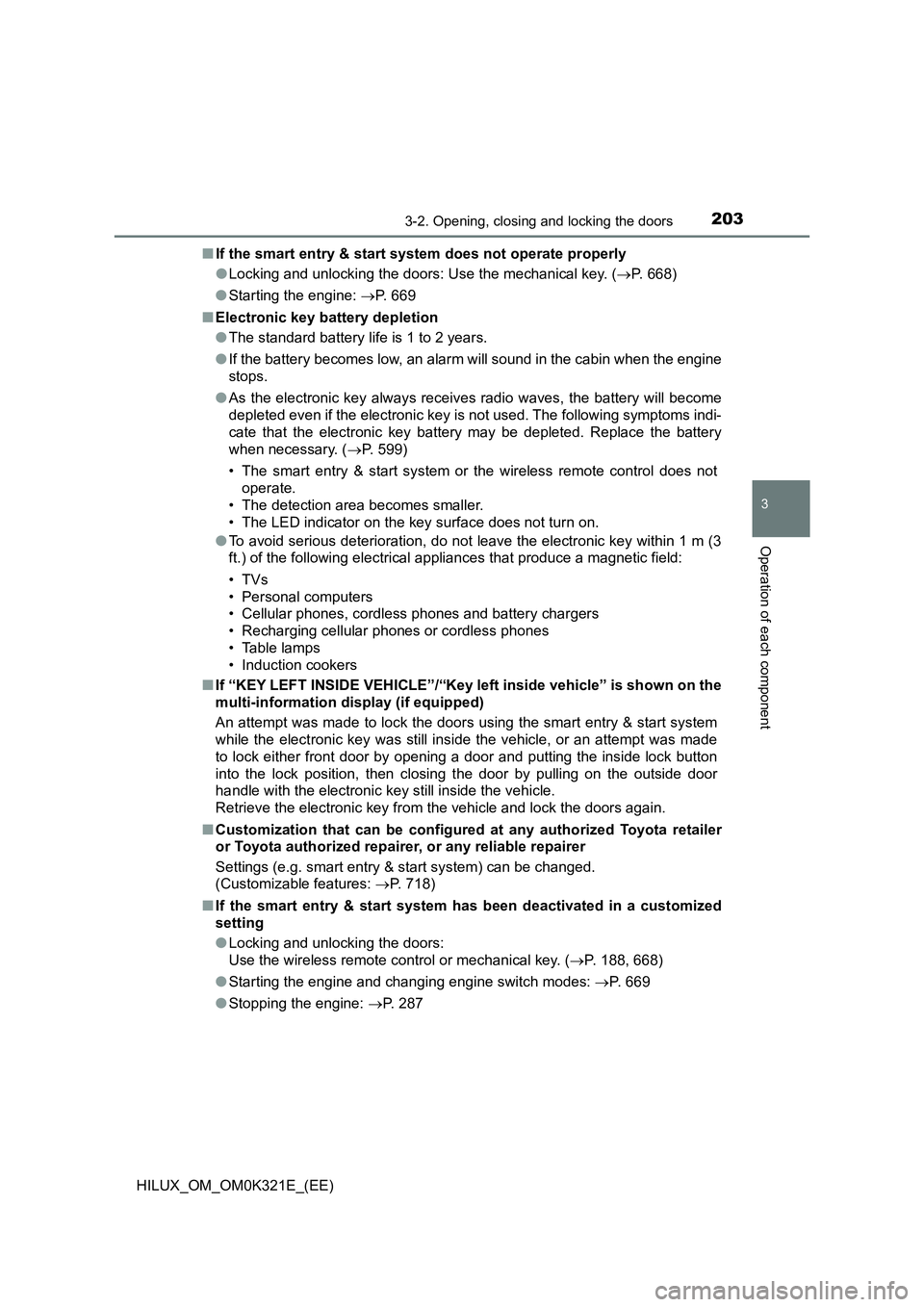
2033-2. Opening, closing and locking the doors
3
Operation of each component
HILUX_OM_OM0K321E_(EE)
■ If the smart entry & start system does not operate properly
● Locking and unlocking the doors: Use the mechanical key. (P. 668)
● Starting the engine: P. 669
■ Electronic key battery depletion
● The standard battery life is 1 to 2 years.
● If the battery becomes low, an alarm will sound in the cabin when the engine
stops.
● As the electronic key always receives radio waves, the battery will become
depleted even if the electronic key is not used. The following symptoms indi-
cate that the electronic key battery may be depleted. Replace the battery
when necessary. ( P. 599)
• The smart entry & start system or the wireless remote control does not
operate.
• The detection area becomes smaller.
• The LED indicator on the key surface does not turn on.
● To avoid serious deterioration, do not leave the electronic key within 1 m (3
ft.) of the following electrical appliances that produce a magnetic field:
•TVs
• Personal computers
• Cellular phones, cordless phones and battery chargers
• Recharging cellular phones or cordless phones
• Table lamps
• Induction cookers
■ If “KEY LEFT INSIDE VEHICLE”/“Key left inside vehicle” is shown on the
multi-information display (if equipped)
An attempt was made to lock the doors using the smart entry & start system
while the electronic key was still inside the vehicle, or an attempt was made
to lock either front door by opening a door and putting the inside lock button
into the lock position, then closing the door by pulling on the outside door
handle with the electronic key still inside the vehicle.
Retrieve the electronic key from the vehicle and lock the doors again.
■ Customization that can be configured at any authorized Toyota retailer
or Toyota authorized repairer, or any reliable repairer
Settings (e.g. smart entry & start system) can be changed.
(Customizable features: P. 718)
■ If the smart entry & start system has been deactivated in a customized
setting
● Locking and unlocking the doors:
Use the wireless remote control or mechanical key. ( P. 188, 668)
● Starting the engine and changing engine switch modes: P. 669
● Stopping the engine: P. 287
Page 314 of 744

3144-3. Operating the lights and wipers
HILUX_OM_OM0K321E_(EE)
■ Battery-saving function
Models for model code destination Blank* (except for Kazakhstan, Armenia
and Morocco)
In order to prevent the battery of the vehicle from discharging, if the head-
lights and/or tail lights are on when the engine switch is turned to the “LOCK”
position (vehicles without smart entry & start system) or off (vehicles with
smart entry & start system), the battery-saving function will operate and auto-
matically turn off all the lights after approximately 20 minutes.
Models for model code destination W*, Kazakhstan, Armenia and Morocco
In order to prevent the battery of the vehicle from discharging, if the light
switch is in or position when the engine switch is turned to the
“LOCK” position (vehicles without smart entry & start system) or off (vehicles
with smart entry & start system), the battery-saving function will operate and
automatically turn off all the lights after approximately 20 minutes.
When any of the following are performed, the battery-saving function is can-
celed once and then reactivated. All the lights will turn off automatically 20
minutes after the battery-saving function has been reactivated:
● When the headlight switch is operated
● When a door is closed once and then opened
*: See “Checking your vehicle’s model” if you are not sure of which model
your vehicle is. ( P. 12)
■ Automatic headlight leveling system (if equipped)
The level of the headlights is automatically adjusted according to the number
of passengers and the loading condition of the vehicle to ensure that the
headlights do not interfere with other road users.
■ Customization
Settings (e.g. light sensor sensitivity) can be changed.
(Customizable features: P. 718)
NOTICE
■To prevent battery discharge
Do not leave the lights on longer than necessary when the engine is not
running.
Page 419 of 744
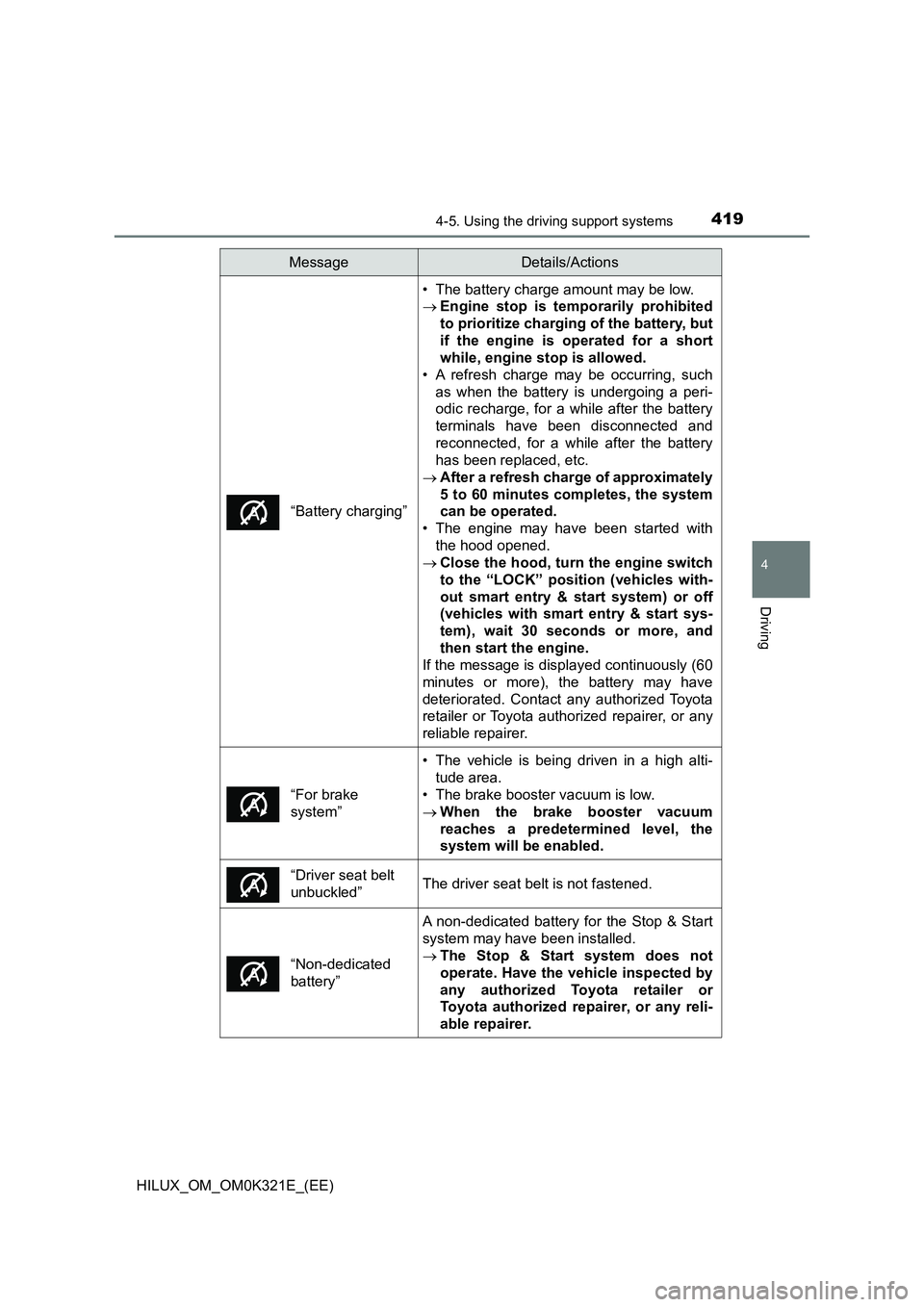
4194-5. Using the driving support systems
4
Driving
HILUX_OM_OM0K321E_(EE)
“Battery charging”
• The battery charge amount may be low.
Engine stop is temporarily prohibited
to prioritize charging of the battery, but
if the engine is operated for a short
while, engine stop is allowed.
• A refresh charge may be occurring, such
as when the battery is undergoing a peri-
odic recharge, for a while after the battery
terminals have been disconnected and
reconnected, for a while after the battery
has been replaced, etc.
After a refresh charge of approximately
5 to 60 minutes completes, the system
can be operated.
• The engine may have been started with
the hood opened.
Close the hood, turn the engine switch
to the “LOCK” position (vehicles with-
out smart entry & start system) or off
(vehicles with smart entry & start sys-
tem), wait 30 seconds or more, and
then start the engine.
If the message is displayed continuously (60
minutes or more), the battery may have
deteriorated. Contact any authorized Toyota
retailer or Toyota authorized repairer, or any
reliable repairer.
“For brake
system”
• The vehicle is being driven in a high alti-
tude area.
• The brake booster vacuum is low.
When the brake booster vacuum
reaches a predetermined level, the
system will be enabled.
“Driver seat belt
unbuckled”The driver seat belt is not fastened.
“Non-dedicated
battery”
A non-dedicated battery for the Stop & Start
system may have been installed.
The Stop & Start system does not
operate. Have the vehicle inspected by
any authorized Toyota retailer or
Toyota authorized repairer, or any reli-
able repairer.
MessageDetails/Actions
Page 420 of 744

4204-5. Using the driving support systems
HILUX_OM_OM0K321E_(EE)
● When the engine automatically restarts while stopped by the Stop & Start
system
■ If “Stop & Start system malfunction Visit your dealer” is shown on the
multi-information display
The system may be malfunctioning. Have the vehicle inspected by any autho-
rized Toyota retailer or Toyota authorized repairer, or any reliable repairer.
■ If the Stop & Start cancel indicator continues to flash
The system may be malfunctioning. Have the vehicle inspected by any autho-
rized Toyota retailer or Toyota authorized repairer, or any reliable repairer.
MessageDetails/Actions
“For climate
control”
Vehicles with automatic air conditioning sys-
tem:
• The air conditioning system has been
turned on or is being used.
• has been turned on.
“For brake
system”
The brake pedal has been depressed further
or pumped.
The system will be enabled after the
engine runs and the brake booster vac-
uum reaches a predetermined level.
“Battery charging”
The battery charge may be low.
The engine is restarted to prioritize
battery charging. Operating the engine
for a short while allows the system to
recover.
“Steering wheel
turned”The steering wheel was operated.
“Driver seat belt
unbuckled”The driver seat belt has been unfastened.
Page 551 of 744
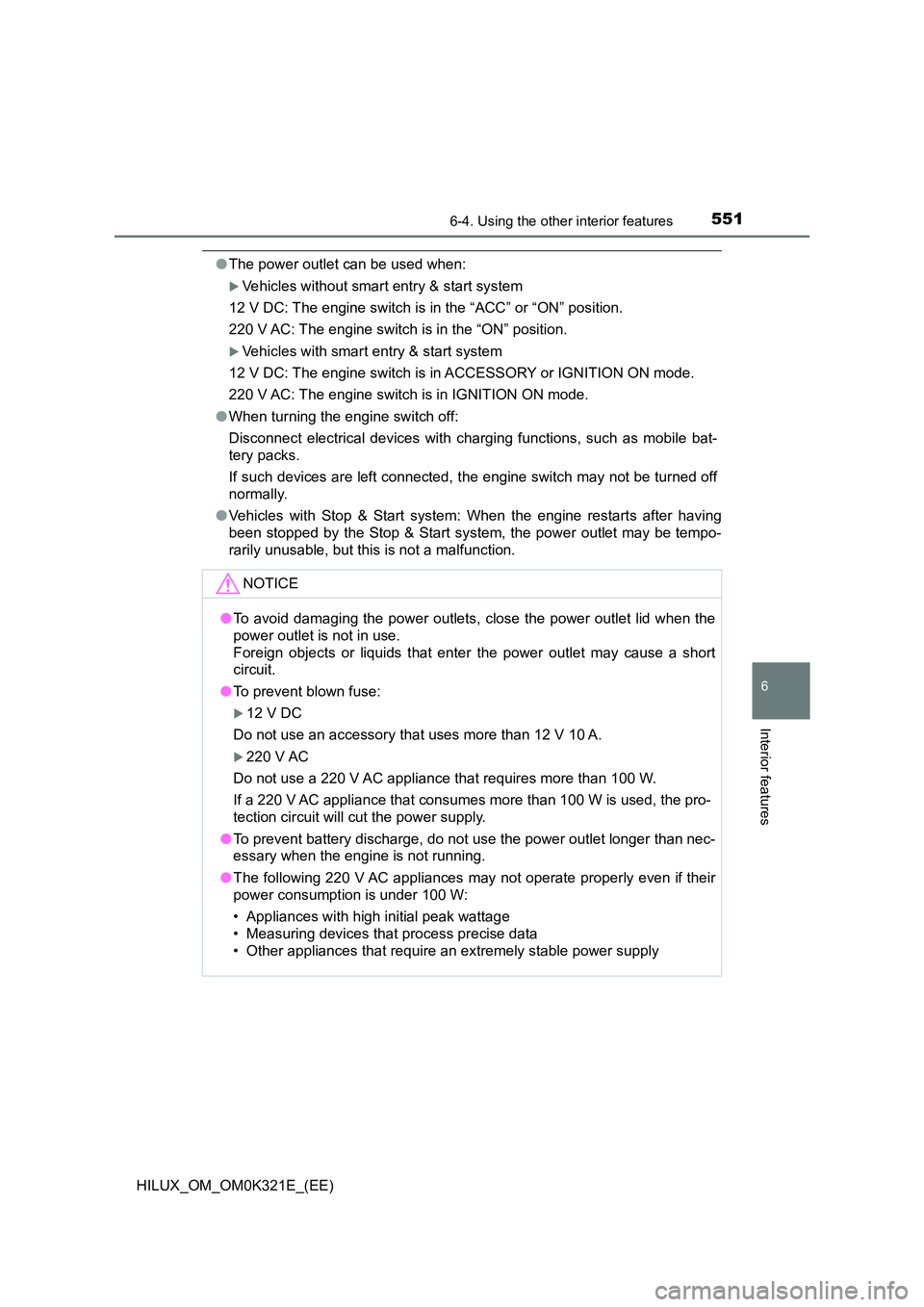
5516-4. Using the other interior features
HILUX_OM_OM0K321E_(EE)
6
Interior features
●The power outlet can be used when:
Vehicles without smart entry & start system
12 V DC: The engine switch is in the “ACC” or “ON” position.
220 V AC: The engine switch is in the “ON” position.
Vehicles with smart entry & start system
12 V DC: The engine switch is in ACCESSORY or IGNITION ON mode.
220 V AC: The engine switch is in IGNITION ON mode.
● When turning the engine switch off:
Disconnect electrical devices with charging functions, such as mobile bat-
tery packs.
If such devices are left connected, the engine switch may not be turned off
normally.
● Vehicles with Stop & Start system: When the engine restarts after having
been stopped by the Stop & Start system, the power outlet may be tempo-
rarily unusable, but this is not a malfunction.
NOTICE
● To avoid damaging the power outlets, close the power outlet lid when the
power outlet is not in use.
Foreign objects or liquids that enter the power outlet may cause a short
circuit.
● To prevent blown fuse:
12 V DC
Do not use an accessory that uses more than 12 V 10 A.
220 V AC
Do not use a 220 V AC appliance that requires more than 100 W.
If a 220 V AC appliance that consumes more than 100 W is used, the pro-
tection circuit will cut the power supply.
● To prevent battery discharge, do not use the power outlet longer than nec-
essary when the engine is not running.
● The following 220 V AC appliances may not operate properly even if their
power consumption is under 100 W:
• Appliances with high initial peak wattage
• Measuring devices that process precise data
• Other appliances that require an extremely stable power supply
Page 580 of 744
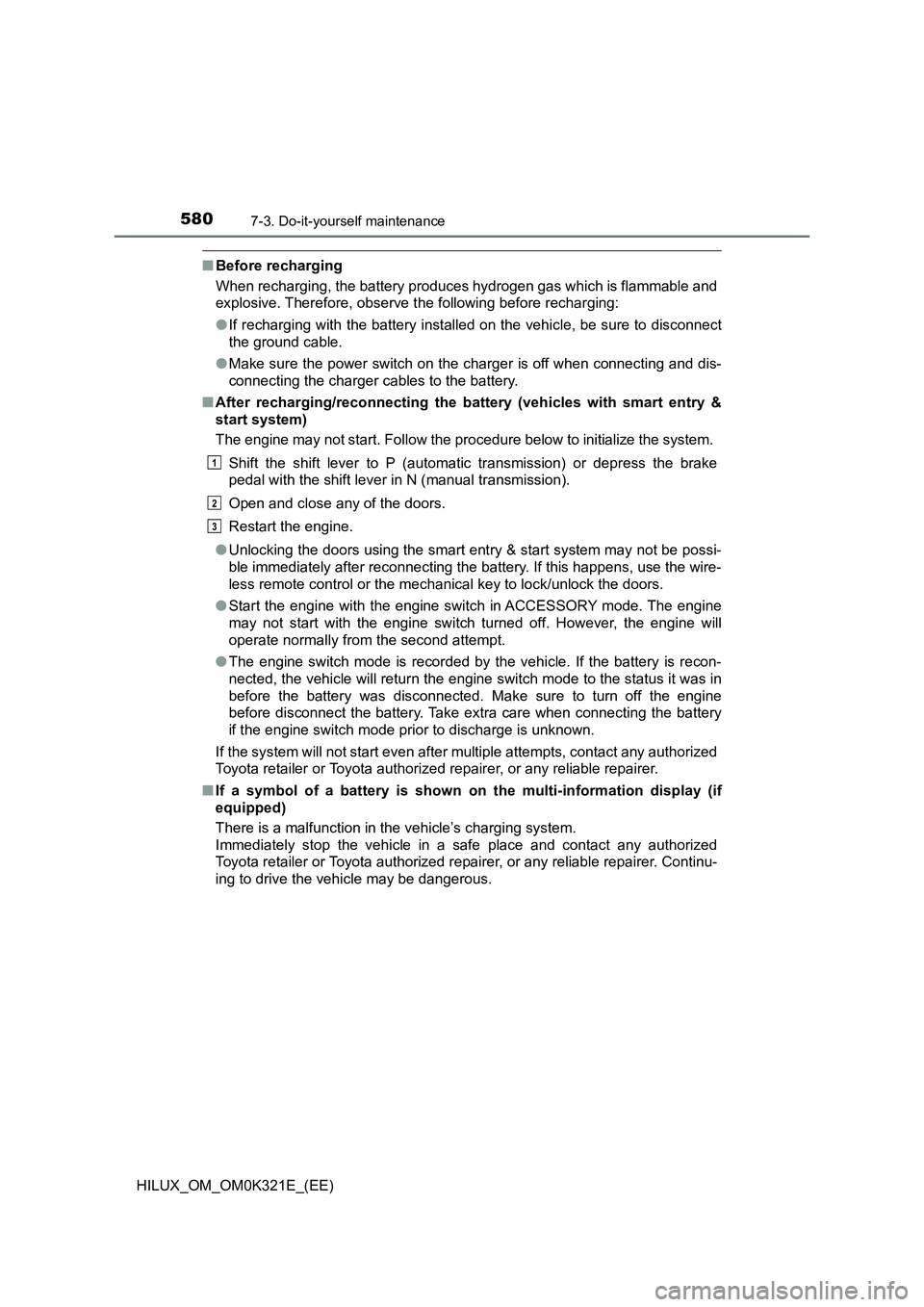
5807-3. Do-it-yourself maintenance
HILUX_OM_OM0K321E_(EE)
■Before recharging
When recharging, the battery produces hydrogen gas which is flammable and
explosive. Therefore, observe the following before recharging:
● If recharging with the battery installed on the vehicle, be sure to disconnect
the ground cable.
● Make sure the power switch on the charger is off when connecting and dis-
connecting the charger cables to the battery.
■ After recharging/reconnecting the battery (vehicles with smart entry &
start system)
The engine may not start. Follow the procedure below to initialize the system.
Shift the shift lever to P (automat ic transmission) or depress the brake
pedal with the shift lever in N (manual transmission).
Open and close any of the doors.
Restart the engine.
● Unlocking the doors using the smart entry & start system may not be possi-
ble immediately after reconnecting the battery. If this happens, use the wire-
less remote control or the mechanical key to lock/unlock the doors.
● Start the engine with the engine switch in ACCESSORY mode. The engine
may not start with the engine switch turned off. However, the engine will
operate normally from the second attempt.
● The engine switch mode is recorded by the vehicle. If the battery is recon-
nected, the vehicle will return the engine switch mode to the status it was in
before the battery was disconnected. Make sure to turn off the engine
before disconnect the battery. Take extra care when connecting the battery
if the engine switch mode prior to discharge is unknown.
If the system will not start even after multiple attempts, contact any authorized
Toyota retailer or Toyota authorized repairer, or any reliable repairer.
■ If a symbol of a battery is shown on the multi-information display (if
equipped)
There is a malfunction in the vehicle’s charging system.
Immediately stop the vehicle in a safe place and contact any authorized
Toyota retailer or Toyota authorized repai rer, or any reliable repairer. Continu-
ing to drive the vehicle may be dangerous.
1
2
3
Page 582 of 744
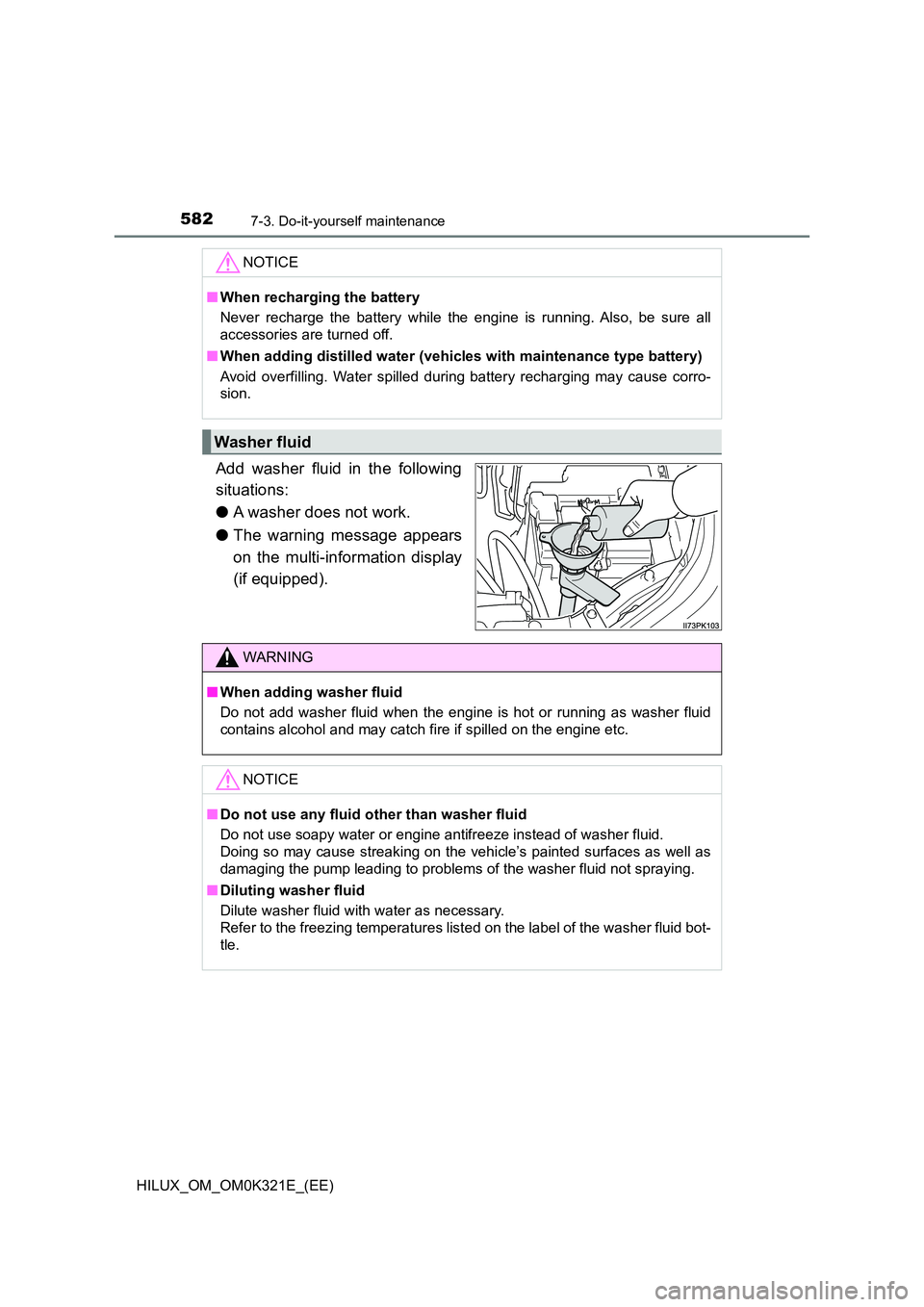
5827-3. Do-it-yourself maintenance
HILUX_OM_OM0K321E_(EE)
Add washer fluid in the following
situations:
● A washer does not work.
● The warning message appears
on the multi-information display
(if equipped).
NOTICE
■ When recharging the battery
Never recharge the battery while the engine is running. Also, be sure all
accessories are turned off.
■ When adding distilled water (vehicles with maintenance type battery)
Avoid overfilling. Water spilled duri ng battery recharging may cause corro-
sion.
Washer fluid
WARNING
■ When adding washer fluid
Do not add washer fluid when the engine is hot or running as washer fluid
contains alcohol and may catch fi re if spilled on the engine etc.
NOTICE
■Do not use any fluid other than washer fluid
Do not use soapy water or engine antifreeze instead of washer fluid.
Doing so may cause streaking on the vehicle’s painted surfaces as well as
damaging the pump leading to problems of the washer fluid not spraying.
■ Diluting washer fluid
Dilute washer fluid with water as necessary.
Refer to the freezing temperatures list ed on the label of the washer fluid bot-
tle.